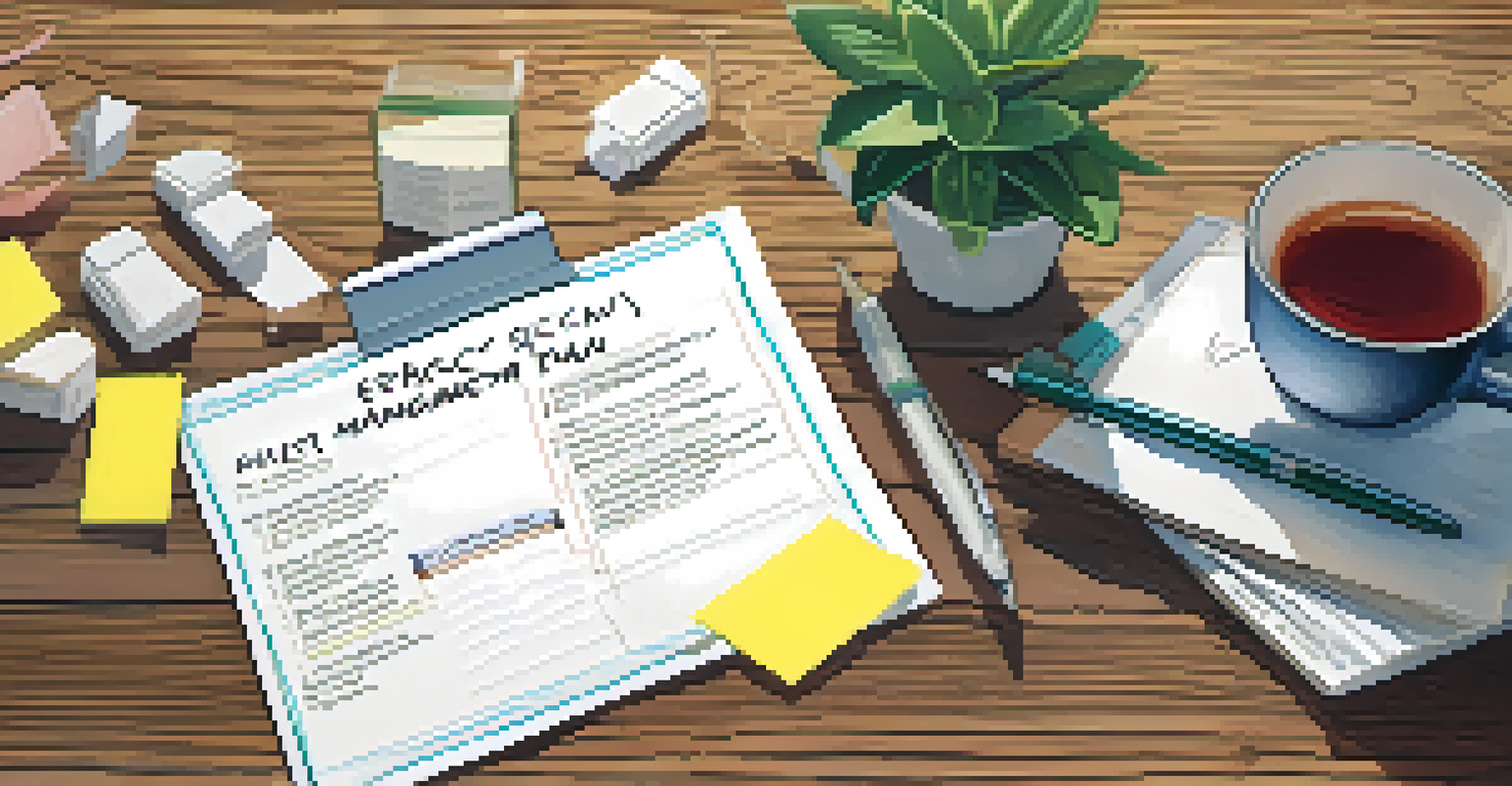Behavioral Techniques for Managing Mental Health Crises

Understanding Mental Health Crises and Their Impact
A mental health crisis can feel overwhelming, not just for the individual but also for those around them. It may manifest as severe anxiety, a panic attack, or even suicidal thoughts. Understanding the signs is crucial for timely intervention and support.
The greatest weapon against stress is our ability to choose one thought over another.
These crises often stem from various factors, including stress, trauma, or even an underlying mental health condition. Recognizing these triggers can help you or someone you care about navigate through the storm. Education and awareness play a significant role in fostering empathy and effective responses.
By understanding what constitutes a mental health crisis, we can better prepare ourselves to address it. This preparation involves not only knowledge but also implementing behavioral techniques that can provide comfort and stability during turbulent times.
The Role of Active Listening in Crisis Situations
Active listening is a powerful tool in managing mental health crises. It involves fully concentrating, understanding, and responding thoughtfully to someone in distress. This simple act can create a safe space for individuals to express their feelings without fear of judgment.

Practicing active listening means being present and engaged, which can help de-escalate a crisis. It can reduce feelings of isolation and validate the person's experience. For example, using phrases like 'I hear you' or 'I understand how that feels' can make a significant difference.
Recognize Mental Health Crises
Identifying the signs of a mental health crisis is crucial for timely intervention and support.
When someone feels heard, it paves the way for more open communication. This connection can lead to identifying the next steps, whether it's finding professional help or simply providing a comforting presence.
Grounding Techniques to Reduce Anxiety and Stress
Grounding techniques are essential tools for managing anxiety and stress during a mental health crisis. These methods help individuals reconnect with the present moment, which can be particularly helpful when overwhelming emotions take over. Simple exercises like focusing on your breath or naming five things you see can work wonders.
Listening is an art that requires attention over talent, spirit over ego, others over self.
Imagine a person feeling anxious in a crowded room. By employing grounding techniques, they can shift their focus from the chaos around them to their own thoughts and feelings. This shift can create a sense of calm amid the storm, making it easier to cope with anxiety.
Incorporating grounding techniques into daily life not only helps during crises but can also build resilience over time. Regular practice can empower individuals to manage stress more effectively when faced with challenges.
Cognitive Behavioral Strategies for Crisis Management
Cognitive Behavioral Therapy (CBT) offers valuable strategies for managing mental health crises. It focuses on identifying and challenging negative thought patterns, which can be particularly beneficial during moments of distress. By reframing these thoughts, individuals can change their emotional responses and behaviors.
For instance, someone facing a crisis might think, 'I can't handle this,' which can exacerbate feelings of helplessness. Through CBT techniques, they can learn to challenge this thought and replace it with a more constructive one, such as, 'I can take it one step at a time.'
Practice Active Listening
Active listening creates a safe space for individuals in distress, helping to validate their feelings and reduce isolation.
This shift in thinking can empower individuals, helping them regain control during a crisis. By incorporating CBT strategies into their toolkit, they can approach challenges with a more positive mindset.
Developing a Crisis Management Plan Together
Creating a crisis management plan is a proactive approach to handling potential mental health crises. This plan should be developed collaboratively with the individual who may face these challenges, ensuring their preferences and comfort levels are prioritized. Involving them in the process fosters a sense of control and ownership.
A well-structured plan might include identifying triggers, coping strategies, and emergency contacts. For example, someone might list their favorite grounding techniques or a trusted friend to call during a crisis. Having these resources readily available can alleviate anxiety.
Regularly reviewing and updating this plan is also essential. As circumstances change, so might the effectiveness of certain strategies, making it crucial to adapt the plan to meet evolving needs.
The Importance of Self-Care During a Crisis
Self-care plays a critical role during mental health crises, not only for the individual in distress but also for their support system. It's easy to forget about personal well-being when focused on helping someone else. However, maintaining one's own mental health ensures that you can provide effective support.
Self-care can take many forms, such as practicing mindfulness, engaging in physical activity, or seeking professional help. For example, taking time for a nature walk or doing a quick meditation can recharge your emotional batteries. This renewal allows you to be more present and empathetic.
Prioritize Self-Care
Self-care is essential for both individuals in crisis and their support systems, promoting resilience and effective assistance.
Encouraging individuals to prioritize self-care during crises can lead to better outcomes. It fosters resilience and strengthens the support network, creating a healthier environment for everyone involved.
Seeking Professional Help When Necessary
While behavioral techniques can be incredibly effective, there are times when professional help is essential. Mental health crises can involve complex emotions and situations that may require the expertise of a trained professional. Recognizing when to seek help is a crucial skill.
If someone is experiencing severe distress, thoughts of self-harm, or any situation posing a risk to their safety, reaching out for professional support is vital. This could involve contacting a therapist, psychiatrist, or even a crisis hotline. These resources are designed to provide immediate assistance and guidance.

Encouraging open dialogue about seeking help can destigmatize the process. Normalizing the conversation around mental health and professional support fosters a culture of understanding, making it easier for individuals to reach out when needed.